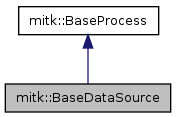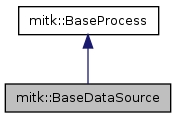Superclass of all classes generating base data (instances of class mitk::BaseData) as output. More...
#include <mitkBaseDataSource.h>


Public Types | |
| typedef mitk::BaseData | OutputType |
| typedef OutputType::Pointer | OutputTypePointer |
Public Member Functions | |
| mitkClassMacro (BaseDataSource, BaseProcess) | |
| virtual itk::DataObject::Pointer | MakeOutput (unsigned int idx)=0 |
| virtual void | SetOutput (OutputType *output) |
| virtual void | SetOutput (unsigned int idx, OutputType *output) |
| virtual OutputType * | GetOutput () |
| virtual OutputType * | GetOutput (unsigned int idx) |
Protected Member Functions | |
| BaseDataSource () | |
| virtual | ~BaseDataSource () |
Superclass of all classes generating base data (instances of class mitk::BaseData) as output.
In itk and vtk the generated result of a ProcessObject is only guaranteed to be up-to-date, when Update() of the ProcessObject or the generated DataObject is called immediately before access of the data stored in the DataObject. This is also true for subclasses of mitk::BaseProcess and thus for mitk::BaseDataSource.
Definition at line 39 of file mitkBaseDataSource.h.
Definition at line 44 of file mitkBaseDataSource.h.
Definition at line 46 of file mitkBaseDataSource.h.
| mitk::BaseDataSource::BaseDataSource | ( | ) | [protected] |
Definition at line 22 of file mitkBaseDataSource.cpp.
{
// Pure virtual functions may not be called in the constructor...
// see ( see Bjarne Stroustrup's C++ PL 3rd ed section 15.4.3 )
//OutputType::Pointer output = static_cast<OutputType*> ( this->MakeOutput( 0 ).GetPointer() );
//Superclass::SetNumberOfRequiredOutputs( 1 );
//Superclass::SetNthOutput( 0, output.GetPointer() );
}
| mitk::BaseDataSource::~BaseDataSource | ( | ) | [protected, virtual] |
Definition at line 33 of file mitkBaseDataSource.cpp.
{
}
| mitk::BaseDataSource::OutputType * mitk::BaseDataSource::GetOutput | ( | ) | [virtual] |
Returns the output with index 0 of the base data source
Definition at line 53 of file mitkBaseDataSource.cpp.
{
if ( this->GetNumberOfOutputs() < 1 )
{
return 0;
}
return static_cast<OutputType*> ( Superclass::GetOutput( 0 ) );
}
| mitk::BaseDataSource::OutputType * mitk::BaseDataSource::GetOutput | ( | unsigned int | idx ) | [virtual] |
Returns the n'th output of the base data source
| idx | the index of the wanted output |
Definition at line 64 of file mitkBaseDataSource.cpp.
{
return static_cast<OutputType*> ( Superclass::GetOutput( idx ) );
}
| virtual itk::DataObject::Pointer mitk::BaseDataSource::MakeOutput | ( | unsigned int | idx ) | [pure virtual] |
Allocates a new output object and returns it. This function is pure virtual because mitk::BaseData contains pure virtual functions and can not directly be instantiated. This must be done by subclasses, which know which subclasses of mitk::BaseData they want to instantiate. Thus, these classes have to set their output themselves via this->SetOutput(MakeOutput(0)) in the constructor!
| idx | the index of the output for which an object should be created |
| mitk::BaseDataSource::mitkClassMacro | ( | BaseDataSource | , |
| BaseProcess | |||
| ) |
| void mitk::BaseDataSource::SetOutput | ( | OutputType * | output ) | [virtual] |
Allows to set the output of the base data source.
| output | the intended output of the base data source |
Definition at line 39 of file mitkBaseDataSource.cpp.
{
this->SetNthOutput( 0, output );
}
| void mitk::BaseDataSource::SetOutput | ( | unsigned int | idx, |
| OutputType * | output | ||
| ) | [virtual] |
Allows to set the n-th output of the base data source.
| idx | The index of the output |
| output | The intended output of the base data source |
Definition at line 46 of file mitkBaseDataSource.cpp.
{
this->SetNthOutput(idx, output);
}
 1.7.2
1.7.2